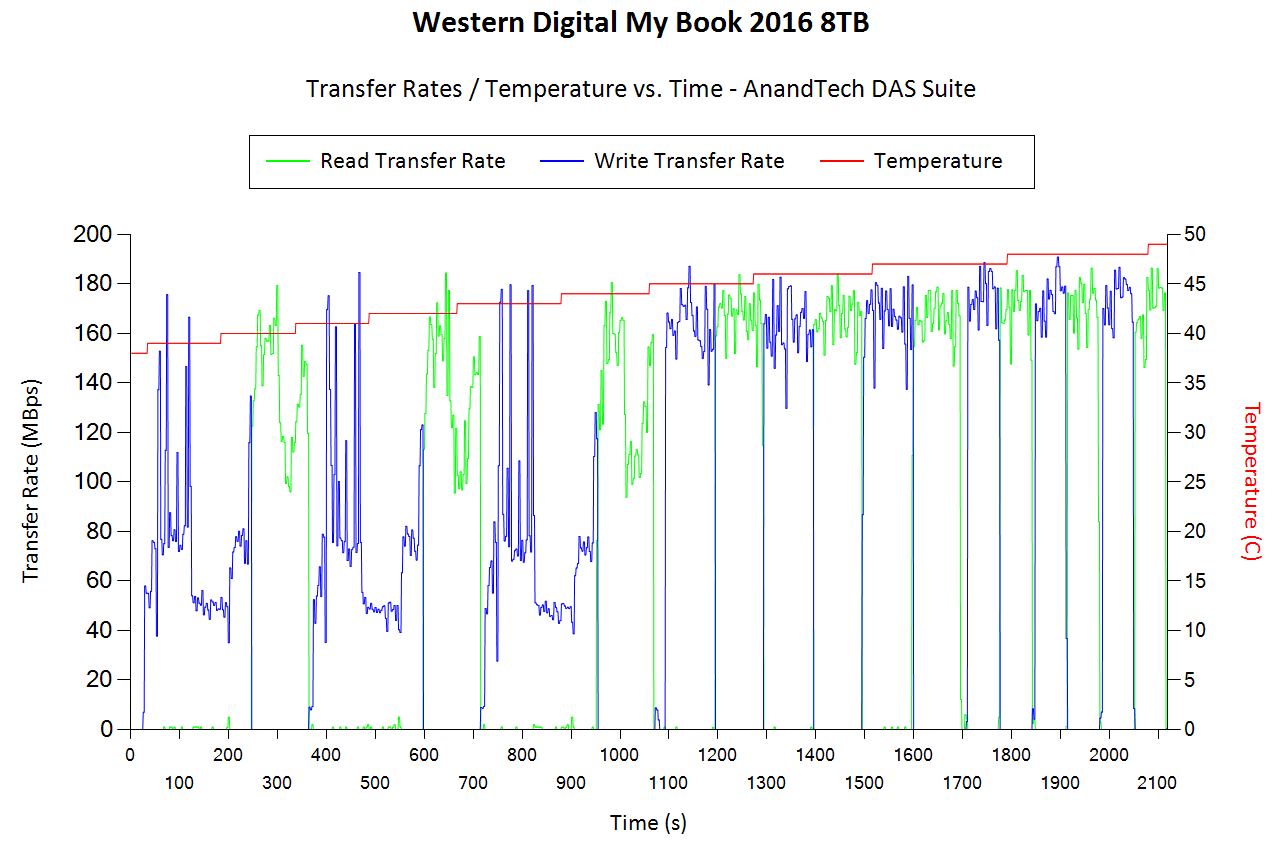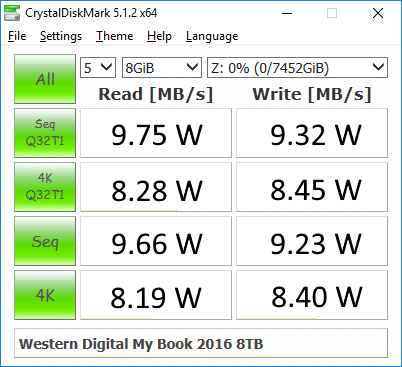Western Digital My Book 8TB and My Passport 4TB External HDDs Review
by Ganesh T S on October 16, 2016 8:00 PM EST- Posted in
- Storage
- USB 3.0
- Western Digital
- DAS
Thermal Aspects and Power Consumption
The thermal design of the enclosures for HDD-based DAS devices is important because hard drives can't withstand as high a temperature range as flash-based devices. Higher temperatures tend to lower the reliability of the drives. In order to identify the effectiveness with which the enclosure can take away heat from the internal drive, we instrumented our robocopy DAS benchmark suite to record various parameters while the robocopy process took place in the background. Internal temperatures can only be gathered for enclosures that support S.M.A.R.T passthrough. Readers can click on the graphs below to view the full-sized version.
| Storage Enclosure Thermal Characteristics | ||
 |
 |
|
The first aspect to note in the above graphs is that the drive temperatures don't get too bad for either unit. The My Book does get close to 50C at the end of the benchmarking, while the My Passport is slightly lower. As expected, these temperatures do not have any effect on the transfer rates. There are no SMR (shingled magnetic recording) firmware shenanigans that throttle transfer rates after a certain amount of data is written into the drive in one go. That said, it is possible that the drives could be kept cooler with a different thermal design, though it is likely that the current design strikes the best balance when considered in conjunction with implementation cost.
Power consumption is measured while processing the same workload on each of the DAS units. CrystalDiskMark 5.1.2's benchmark traces with a region size of 8GB and the number of repetitions set to 5 are used. For bus-powered devices, Plugable's USBC-TKEY power delivery sniffer was placed between the host PC and the storage bridge to record the power consumption. For AC-powered devices, the Ubiquiti mFi mPower Pro was used for the same purpose. The average power consumption for each access trace was recorded. The pictures below present the numbers in a compact and easy to compare manner.
| Power Consumption - CrystalDiskMark | ||
 |
 |
|
The power consumption numbers are not surprising - the AC-powered My Book 8TB consumes between 8W and 10W at the wall for different access traces, while the bus-powered My Passport 4TB consumes between 2.5W and 3.5W for the same. At idle, the My Book 8TB consumes around 6.9W, and that goes to 0W when the internal drive spins down. On the other hand, the My Passport 4TB consumes around 1.45W at idle, and, around 0.89W with the internal drive spun down.










35 Comments
View All Comments
JETninja - Sunday, October 16, 2016 - link
I would never trust Seagate after having two 1TB 7200rpm HD's fail within months of each other after only a couple years of use. Have an old WD 1TB Passport that has had zero issues and works great, same with all my WD HD's. I use the Passport for Photo backup as well as also storing them in the Cloud.....negusp - Sunday, October 16, 2016 - link
This article is about WD...Notmyusualid - Monday, October 17, 2016 - link
Yes it was moronic comment placement, but my 4TB 2.5" Seagate disk failed also, and it was SO much data to lose... I guess it is his pain that is coming out.fangdahai - Monday, October 17, 2016 - link
Same here. 2 hard disks died in months. Seagate is terrible.Zak - Wednesday, October 19, 2016 - link
But surely you had backups, no? How could you possibly lose "so much data"?Ro_Ja - Thursday, October 20, 2016 - link
Maybe because he ignored the increasing errors his Hard Drive had.StormyParis - Sunday, October 16, 2016 - link
Anecdote is funny that way, I've had way more WD drives die on me than Seagate, to the point I'm strongly leaning the other way.Token2k8 - Sunday, October 16, 2016 - link
Same, I've had terrible luck with WD. They die on me within about 1 year after purchase. I've been using the same Seagate for going on 8 years with no issues.Token2k8 - Monday, October 17, 2016 - link
I know people that have terrible luck with Seagate as well. Always found that odd.valinor89 - Monday, October 17, 2016 - link
The seagate 7200.11 firmware brick got me once, the replacement lasted one year... I have gone with WD since then and no problems...